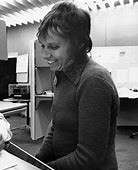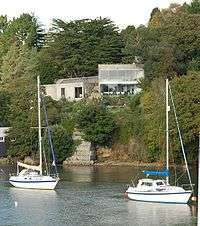Wendy Foster
Wendy Ann Foster, née Cheesman, (September 1937 – 15 January 1989)[1][3] was a British architect and co-founder of Team 4 and Foster Associates.
Wendy Cheesman Foster | |
|---|---|
 | |
| Born | Wendy Ann Cheesman September 1937[1] |
| Died | 15 January 1989 (aged 51)[2][3] |
| Nationality | British |
| Alma mater | Yale School of Architecture |
| Occupation | Architect |
| Spouse(s) | Norman Foster (m. 1964) |
| Children | 4 sons[4] |
| Practice | Team 4 (1963-67) Foster Associates (1967-1989) |
| Buildings | Creek Vean (Team 4), Sainsbury Centre for Visual Arts, Willis Faber and Dumas building, HSBC Building in Hong Kong (Foster Associates) |
Private life
Wendy Cheesman's sister is Georgie Wolton, née Cheesman, who is also a qualified architect. She was the former girlfriend of Richard Rogers and later went on to marry Norman Foster in 1964.[5][6] Wendy Foster died of cancer in 1989, when she was still a partner/director at Foster Associates.[4][3]
Career

Team 4 was an architectural firm, established in 1963 by architecture graduates Su Rogers (née Brumwell), Wendy Cheesman, Norman Foster and Richard Rogers.[7][6] The firm originally included Wendy Cheesman's sister Georgie Wolton who, as the only qualified architect of the group, allowed the practice to function. Georgie Cheeseman left after only a few months, leaving the remaining members to try to pass their professional exams while continuing to practice.[7]
The notable buildings that she worked on while at Team 4, includes the first ever house to win a RIBA award - Creek Vean House, Feock, Cornwall, England (1966), Reliance Controls factory, Swindon (1967), Jaffe House (also known as Skybreak House), which was Humphrey Spender's house, Maldon, Essex (1965-1966) and Wates Housing, Coulsdon, Surrey (1965), all in England.[8]
By June 1967, Foster and Rogers, had both decided to dissolve the firm.[9][10] The Rogers' (Richard Rogers and Su Rogers) established Richard and Su Rogers Architects and the Fosters (Norman Foster and Wendy Foster, née Cheesman),[6] established Foster Associates.[6] The notable buildings that Wendy Foster was involved in include Sainsbury Centre for Visual Arts, Willis Faber and Dumas building, and the HSBC Building in Hong Kong.
See also
References
- "Index entry". FreeBMD. ONS. Retrieved 10 September 2017.
- "Norman Foster: Man of steel". The Independent. Retrieved 2017-09-10.
- "Foster Associates Ltd: Directors Report and Financial Statements for the year ended 30 April 1989". Companies House. Retrieved 2017-09-10.
- "Foster's brew". Telegraph Media Group. Retrieved 10 September 2017.
- "Reaching for the sky". The Independent. Retrieved 10 September 2017.
- "The Guardian Profile: Sir Norman Foster: The master builder". The Guardian. Retrieved 2017-09-10.
- Ian Lambot (Ed.), "Norman Foster: Buildings and Projects Volume 1 1964-1973", Watermark Publications (1991), ISBN 1-873200-01-3. Chapter 1 "Team 4" by Sir Richard Rogers, pp. 14-15
- Hall, Jane (Writer on architecture) (16 October 2019). Breaking ground : architecture by women. London. p. 69. ISBN 978-0-7148-7927-7. OCLC 1099690151.
- "El talento es importante, pero lo es más la constancia y el esfuerzo". Gonzalo Carazo. Retrieved 2017-09-06.
- "Richard Rogers, Architect (1933-), From the House to the City". Design Museum. Retrieved 2009-10-04.